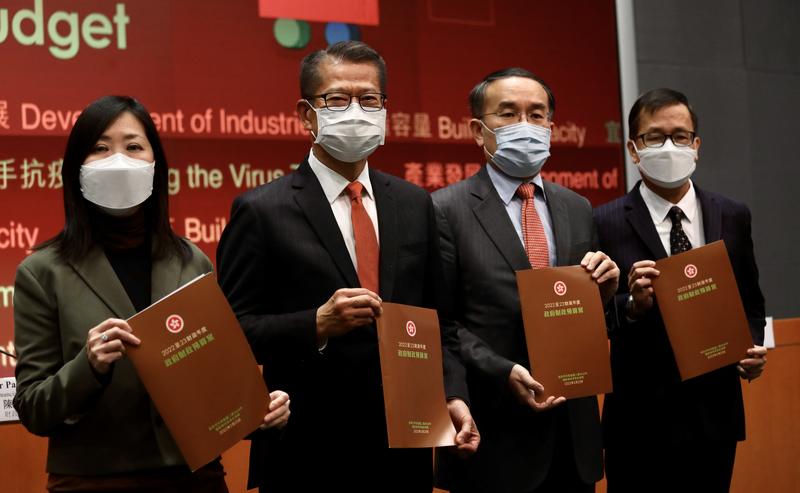 Hong Kong's Financial Secretary Paul Chan Mo-po (2nd left), together with Permanent Secretary for Financial Services and the Treasury (Treasury) Cathy Chu Man-ling (1st left), Secretary for Financial Services and the Treasury Christopher Hui Ching-yu (2nd right) and Government Economist Andrew Au Sik-hung, pose for photos with booklets of the 2022-23 Hong Kong Budget during a press conference at the Central Government Offices in Hong Kong, Feb 23, 2022. (EDMOND TANG / CHINA DAILY)
Hong Kong's Financial Secretary Paul Chan Mo-po (2nd left), together with Permanent Secretary for Financial Services and the Treasury (Treasury) Cathy Chu Man-ling (1st left), Secretary for Financial Services and the Treasury Christopher Hui Ching-yu (2nd right) and Government Economist Andrew Au Sik-hung, pose for photos with booklets of the 2022-23 Hong Kong Budget during a press conference at the Central Government Offices in Hong Kong, Feb 23, 2022. (EDMOND TANG / CHINA DAILY)
HONG KONG - The Hong Kong government plans to dish out HK$170 billion ($21.79 billion) to launch a raft of countercyclical measures for individuals and enterprises in the 2022-23 Budget.
The plan is a bid to relieve people’s hardships as the city’s economic condition has deteriorated rapidly in the past two months amid the Omicron variant outbreak.
INFOGRAPHIC: HK 2022-23 Budget at a glance
“The rapid spread of the virus and its profound impact have dealt a heavy blow to many people, disrupting both their life and work, and seriously affected the operations of small and medium-sized enterprises, thus undermining confidence in the future,” Financial Secretary Paul Chan Mo-po said.
“We need to direct more resources to relieve people’s hardship and provide SMEs with some breathing space so as to stabilize the economy and maintain public confidence,” he added.
Among various measures of the expansionary fiscal policy package, the administration will commit HK$66.4 billion to launch the second disbursement of the electronic Consumption Voucher Scheme, in which vouchers with a total value of HK$10,000 will be disbursed in separate installments to the 6.6 million qualified Hong Kong residents.
The budget includes important support measures to help our businesses and community. I am particularly grateful for the assistance being given to small businesses, which form the core of our local economy and have been particularly hard hit over the past two years.
Luanne Lim, HSBC Hong Kong Chief Executive
The expansionary fiscal policy package also included measures such as reducing more than 2 million taxpayers’ salaries tax and tax under personal assessment for the 2021-22 year of assessment by 100 percent, subject to a ceiling of HK$10,000; rates concessions for some 3 million domestic properties for 2022-23; and around 2.8 million residential households will be granted a financial subsidy in their residential electricity accounts.
The government plans to fork out HK$3.3 billion to provide a tax deduction for domestic rental expenses starting the 2022-23 assessment year, subject to a deduction ceiling of $100,000 for a year of assessment. The administration is expected to introduce a bill into the Legislative Council in the second quarter of this year.
Regarding struggling enterprises, the government recommended reducing the profits tax for the 2021-22 year of assessment by 100 percent; providing a rates concession for non‑domestic properties for four quarters of 2022‑23; waiving the business registration fees for 2022‑23; and extending the waivers/concessions of the existing 34 groups of government fees and charges for 12 months starting in October this year.
ALSO READ: Temporary law supports tenants to tide over pandemic
As regards enhancing the cash-flow support for businesses, the Special 100% Loan Guarantee under the SME Financing Guarantee Scheme will be enhanced by increasing the maximum loan amount per enterprise from the total amount of employee wages and rents for 18 months to that for 27 months, with the loan ceiling raised from HK$6 million to HK$9 million, and by extending the maximum repayment period from eight years to 10 years. The Hong Kong Monetary Authority will extend the Pre‑approved Principal Payment Holiday Scheme through the Banking Sector SME Lending Coordination Mechanism for six months to the end of October.
“The Hong Kong government needs to expand its fiscal stimulus as many residents and firms are in dire straits,” French-based investment bank Natixis said. “Giving consumption vouchers is the most feasible short-term solution. More tax allowance should be given, and the current support for the low-income population should be extended. For the affected industries, the government should expand the support fund, as virtually all services sectors are now subjected to restrictions now.”
ALSO READ: New budget a much-needed shot in the arm for Hong Kong
HSBC Hong Kong Chief Executive Luanne Lim said, “The budget includes important support measures to help our businesses and community. I am particularly grateful for the assistance being given to small businesses, which form the core of our local economy and have been particularly hard hit over the past two years.”
Hong Kong Trade Development Council Chairman Peter Lam Kin-ngor added: “SMEs have braced unprecedented challenges in the last two years roiled by the COVID-19 pandemic. This budget has proposed many measures facilitating economic growth, including policies to relieve pressure in corporate business operations, as well as support SMEs’ cash turnover and financing.”


